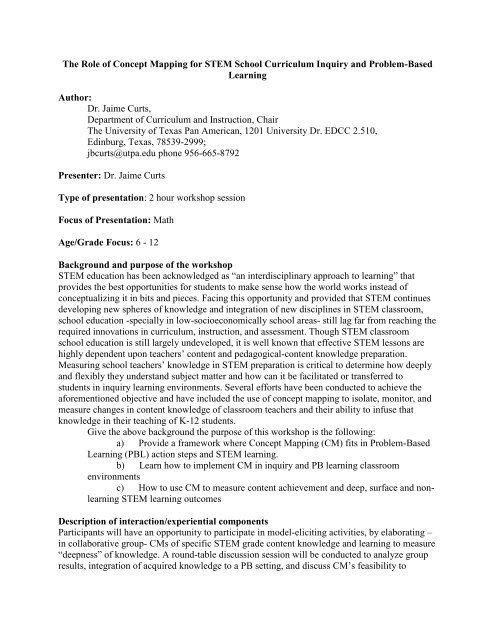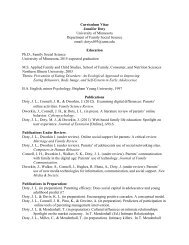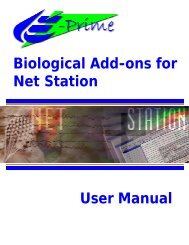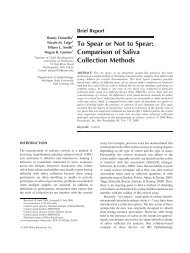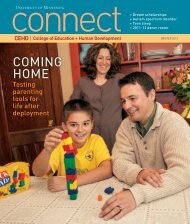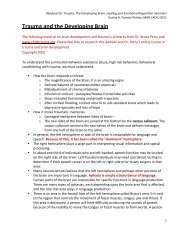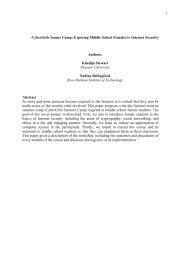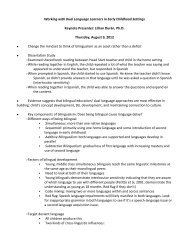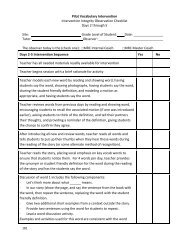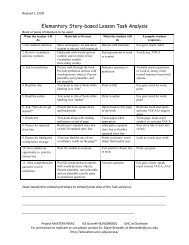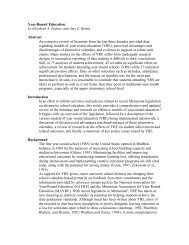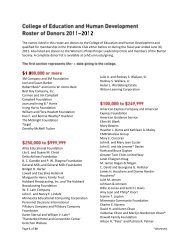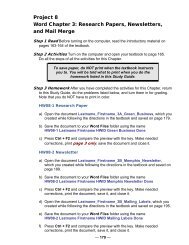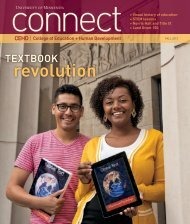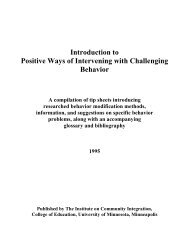The Role of Concept Mapping for STEM School Curriculum Inquiry ...
The Role of Concept Mapping for STEM School Curriculum Inquiry ...
The Role of Concept Mapping for STEM School Curriculum Inquiry ...
You also want an ePaper? Increase the reach of your titles
YUMPU automatically turns print PDFs into web optimized ePapers that Google loves.
<strong>The</strong> <strong>Role</strong> <strong>of</strong> <strong>Concept</strong> <strong>Mapping</strong> <strong>for</strong> <strong>STEM</strong> <strong>School</strong> <strong>Curriculum</strong> <strong>Inquiry</strong> and Problem-Based<br />
Learning<br />
Author:<br />
Dr. Jaime Curts,<br />
Department <strong>of</strong> <strong>Curriculum</strong> and Instruction, Chair<br />
<strong>The</strong> University <strong>of</strong> Texas Pan American, 1201 University Dr. EDCC 2.510,<br />
Edinburg, Texas, 78539-2999;<br />
jbcurts@utpa.edu phone 956-665-8792<br />
Presenter: Dr. Jaime Curts<br />
Type <strong>of</strong> presentation: 2 hour workshop session<br />
Focus <strong>of</strong> Presentation: Math<br />
Age/Grade Focus: 6 - 12<br />
Background and purpose <strong>of</strong> the workshop<br />
<strong>STEM</strong> education has been acknowledged as “an interdisciplinary approach to learning” that<br />
provides the best opportunities <strong>for</strong> students to make sense how the world works instead <strong>of</strong><br />
conceptualizing it in bits and pieces. Facing this opportunity and provided that <strong>STEM</strong> continues<br />
developing new spheres <strong>of</strong> knowledge and integration <strong>of</strong> new disciplines in <strong>STEM</strong> classroom,<br />
school education -specially in low-socioeconomically school areas- still lag far from reaching the<br />
required innovations in curriculum, instruction, and assessment. Though <strong>STEM</strong> classroom<br />
school education is still largely undeveloped, it is well known that effective <strong>STEM</strong> lessons are<br />
highly dependent upon teachers‟ content and pedagogical-content knowledge preparation.<br />
Measuring school teachers‟ knowledge in <strong>STEM</strong> preparation is critical to determine how deeply<br />
and flexibly they understand subject matter and how can it be facilitated or transferred to<br />
students in inquiry learning environments. Several ef<strong>for</strong>ts have been conducted to achieve the<br />
a<strong>for</strong>ementioned objective and have included the use <strong>of</strong> concept mapping to isolate, monitor, and<br />
measure changes in content knowledge <strong>of</strong> classroom teachers and their ability to infuse that<br />
knowledge in their teaching <strong>of</strong> K-12 students.<br />
Give the above background the purpose <strong>of</strong> this workshop is the following:<br />
a) Provide a framework where <strong>Concept</strong> <strong>Mapping</strong> (CM) fits in Problem-Based<br />
Learning (PBL) action steps and <strong>STEM</strong> learning.<br />
b) Learn how to implement CM in inquiry and PB learning classroom<br />
environments<br />
c) How to use CM to measure content achievement and deep, surface and nonlearning<br />
<strong>STEM</strong> learning outcomes<br />
Description <strong>of</strong> interaction/experiential components<br />
Participants will have an opportunity to participate in model-eliciting activities, by elaborating –<br />
in collaborative group- CMs <strong>of</strong> specific <strong>STEM</strong> grade content knowledge and learning to measure<br />
“deepness” <strong>of</strong> knowledge. A round-table discussion session will be conducted to analyze group<br />
results, integration <strong>of</strong> acquired knowledge to a PB setting, and discuss CM‟s feasibility to
improve teachers‟ and students‟ understanding <strong>of</strong> <strong>STEM</strong> knowledge. Pre and post testing<br />
activities (using electronic clickers) will be used to illustrate the integration <strong>of</strong> traditional<br />
assessments with CM‟s authentic assessment results.<br />
How does it involve <strong>STEM</strong> Education?<br />
This workshop will also illustrate how to use CM to build learners „capacity and as a tool to<br />
enhance <strong>STEM</strong> school curriculum education


